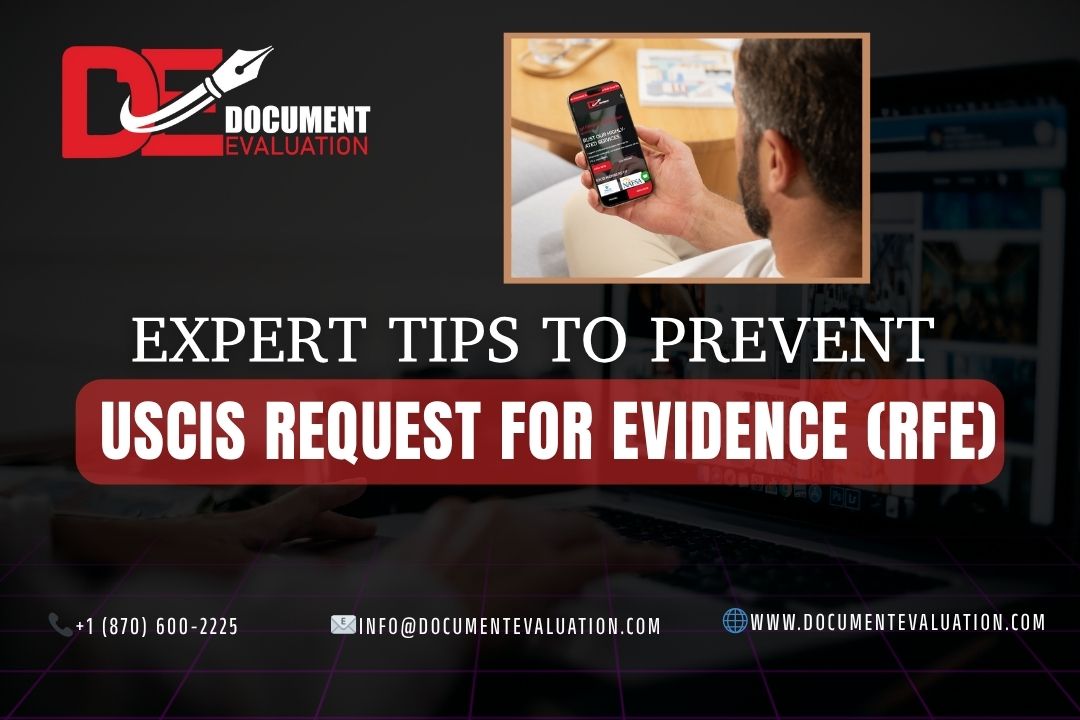“USCIS Request for Evidence (RFEs) isn’t random. It’s just the result of invisible gaps in your paperwork.”
A client once told me, “The worst part wasn’t the delay—it was not knowing if I’d done something wrong or if USCIS just didn’t understand my case.”
It’s the consequences you often face because of an RFE: confusion, panic, and the scramble of paperwork you thought was already good enough. But here’s the truth: You can prevent most RFEs. They aren’t caused by bad cases. The reason behind most RFEs is “they miss the context.”
What USCIS Really Means When You Receive an RFE
The documents people submit aren’t actually the ones USCIS is expecting. Receiving a Request for Evidence (RFE) from USCIS can be overwhelming. However, understanding the common triggers and addressing them can reduce the chances of receiving an RFE. Think of it as your second and best chance to make your application stronger.
Read this blog to understand the main triggers behind receiving an RFE. Furthermore, you’ll learn about the strategies to avoid RFEs. Most importantly, we’ll delve into the importance of expert opinion letters. Read on till the end to learn how credential evaluation services can reinforce your visa application.
So let’s get started, shall we?
Why are RFEs Exploding in 2025?
Firstly, let’s understand the reason behind the explosion of RFEs in 2025. Figure out what factors are contributing to this trend:
1. Extra Vetting of Visa Application
The Trump administration has ordered enhanced vetting of all Harvard University-linked visa applications.
So what does that mean for you?
Increased Vetting: Visa Applicants aiming to get into Harvard University will face more background checks. It will include social media activity and personal histories relating to anti-Semitism or violence.
Potential for Additional Question Verification: Applicants may be asked a few questions during an interview. These questions will be regarding their social media accounts, which need to be made public. It is necessary to pass the vetting process.
Longer Processing Time: These lengthy processes can increase potential delays in travel plans for applicants.
Security Concerns: Applicants with specific social media profiles indicate a broader stress on national security.
Possible Rejection of Visa: Applicants with any connection to anti-Semitic activities and violence could face visa denials.
2. Biometric Demands
Uncertain Justifications: RFEs will lead to uncertainty and anxiety about what might trigger additional complexities.
Potential delays: The new RFEs can prolong visa processing times as applicants and employers deal with additional steps.
Strict Vetting Processes: There will be more focus on personal data and other adverse information. It can lead to higher chances of visa refusal, especially for applicants with complex backgrounds.
Birthright citizenship changes: President Donald Trump announced an executive order. The order was to deny U.S. citizenship to children born in the U.S. to parents who are in the country illegally.
- This order also targets legal immigrants.
- Parents on H-1B. H-4, F-1, or other non-immigrant visas.
Struggling with an RFE? It’s fixable.
[Get Your Expert Opinion Letter →]
Top 5 Triggers for USCIS Request For Evidence (RFEs)
Here are the top 5 RFE triggers—and how to beat them:
1. Bona Fide Marriage Proof Gaps
USCIS wants clear, convincing evidence that your marriage is real, not just on paper. Generic documents aren’t enough.
- Submit joint lease agreements, utility bills, and bank account statements.
- Include travel tickets, photos, and wedding invitations.
- Add proof of shared responsibilities like taxes, insurance, or loan documents.
- Use letters from friends and family attesting to your relationship.
- Include less common evidence, like shared subscriptions or pet insurance.
2. Translation Troubles
A solid document can still be rejected if the translation doesn’t meet USCIS standards.
- Ensure a full certification from the translator.
- Include their name, address, and signature.
- Confirm a declaration of translation accuracy.
- Verify the translator’s qualifications.
- Make sure the formatting matches the original document as closely as possible.
3. Financial Shortfalls
Petitions can fail if your financials don’t meet the income requirement, but there are ways to bridge the gap.
- Use a joint sponsor with sufficient income.
- Add liquid assets like savings or investments.
- Use the 3-to-1 asset rule to supplement income.
- Include pay stubs, tax returns, and employer letters.
- Double-check the poverty guidelines for household size.
4. “Specialty Occupation” Holes
For H-1B visas, USCIS needs proof that the job requires specialized skills tied to a specific degree.
- Submit detailed job descriptions highlighting technical duties.
- Use O*NET job codes to link the role to the required qualifications.
- Provide org charts showing your role in the company.
- Include expert opinion letters from professionals.
- Show past hiring history requiring similar degrees.
5. Unclear Employer-Employee Relationship
Without evidence of control and oversight, USCIS may assume the employment isn’t valid.
- Submit employment contracts with specific duties and oversight details.
- Add timesheets or project reports that reflect active supervision.
- Include org charts showing the chain of command.
- Provide an itinerary if working off-site or at a client location.
- Gets a letter from the employer describing how work is assigned and reviewed.
- Each of these issues can be resolved with the right strategy and expert help.
How Our Expert Opinion Letters Improve USCIS RFEs Outcomes
Did you get an RFE (Request for Evidence) from USCIS for your visa application? You don’t have to figure it out by yourself. You’ve landed at the right spot!
At Document Evaluation LLC, we help you craft expert opinion letters to make your case stronger. We have helped hundreds of applicants get their petitions back on track with our expert opinion letters.
One of our clients, “Sandeep,” received a USCIS Request for Evidence, and he needed an expert opinion letter urgently. Most providers told him it would take weeks. Some said they didn’t have the right expert.
At Document Evaluation LLC, we quickly delivered a report for him.
Here is what Sandeep want to say:
“It was great support from Mike and the team at Document Evaluation. They worked very fast and very thoroughly. They submitted very extensive reports. I am very happy with their service.” Sandeep Mahajan
Sandeep is not alone; we have helped hundreds of our clients with our expert opinion letters, which include:
H-1B Visa EOL:
- H1-B expert opinion letters ensure you meet the specialized requirements for this particular visa category.
- We assist in showcasing your expertise in a specific field to increase the chances of your visa approval.
O-1 Visa EOL:
- It is designed specifically for individuals with extraordinary abilities.
- It validates your exceptional achievements.
- Highlight your contribution to your field.
L-1 Visa EOL
- Supports your application by validating your skills and knowledge.
Assist with intra-company transfer applications. - Strengthen your case for L-1 visa approval through a detailed assessment.
EB-1 Visa EOL
- Helps in highlighting your achievements and academic achievements.
- Provide a detailed evaluation to support your EB-1 visa application.
- Make your path to becoming a U.S. permanent citizen easier.
Document Evaluation LLC also offers expert opinion letters for work experience and PERM Labor Certification. We are not limited to just expert opinion letters. We provide the best credential evaluation services for international credentials in various offerings.
And we are proud to be behind these successful visa application stories.
Ready to start yours? Reach out to us without any delay.



